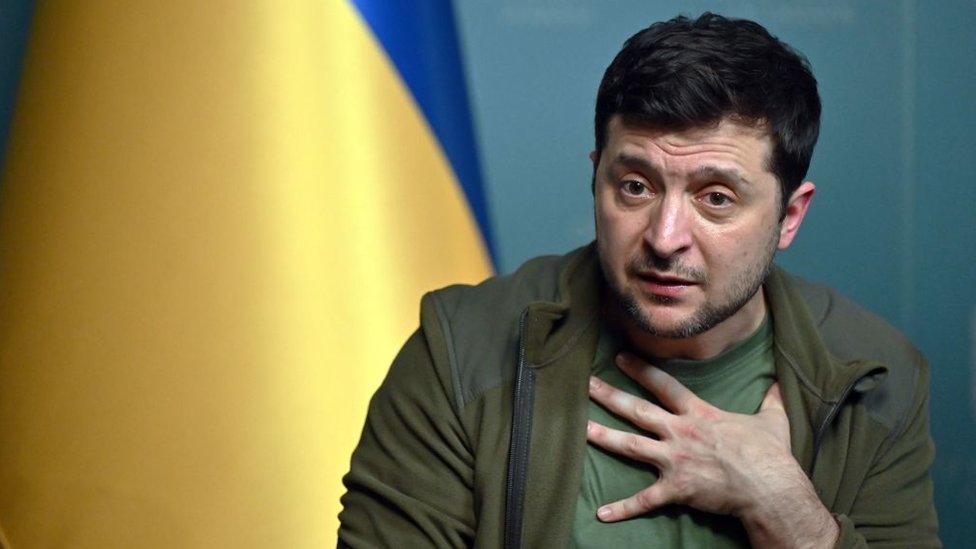Siege of Mariupol: Fresh Russian attacks throw evacuation into chaos
- Published
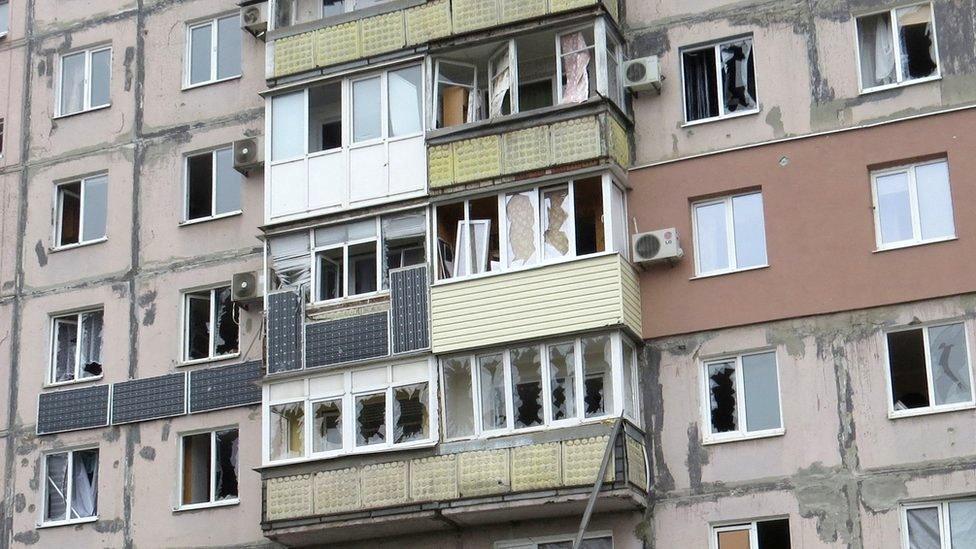
A residential building in Mariupol, which locals say was almost completely destroyed by Russian shelling
Russian forces continued to shell the Ukrainian city of Mariupol on Saturday, despite agreeing to a ceasefire just hours earlier - throwing an attempted mass evacuation of civilians into chaos.
"I'm right now in Mariupol, I'm on the street, I can hear shelling every three to five minutes," said Alexander, a 44-year-old engineer and resident of the city.
The green corridor set up to get people out was not working, he said.
"I can see cars of people who tried to flee and they are coming back. It is chaos."
Three hours after the ceasefire was supposed to begin, at 09:00 (07:00 GMT), Mariupol authorities announced they had postponed a planned mass evacuation because of the continued bombardment.
"We ask the people in Mariupol to head for the shelter, there will be more information on the evacuation asap," a statement said.
"Due to the fact that the Russian side is not sticking to the ceasefire and continues to shoot Mariupol itself and the outskirts, the evacuation has been postponed."
Mariupol, a port city of about 400,000 people, is a key strategic target for Russia because seizing it would allow Russian-backed separatist forces in eastern Ukraine to join forces with troops in Crimea, the southern peninsula annexed by Russia in 2014.
Russia has not commented on the renewed shelling, but its defence ministry said civilians had not used the escape routes from Mariupol and Volnovakha and accused Ukrainian authorities of preventing people from leaving, Russian state media said.
Maxim, a 27-year-old IT developer, sent the BBC videos from his grandparents' Mariupol apartment building showing smoke from explosions near the city centre and he said smoke was rising from the highway to Zaporizhzhia - the planned ceasefire escape route.
"We can hear missiles and see smoke coming from buildings around us," Maxim said. "Our apartment building is full of people now because everyone is fleeing the shelling into the city centre.
"Some people have come from the left bank district and they said it was a total disaster there and there were bodies in the streets."
Family members of those trapped in the city said they feared their loved ones were not getting any up-to-date information about what was happening.
"I talked to my uncle Dmitri for less than a minute before the phone connection cut," said Juliana Ivliova, 26.
"They didn't know about the evacuation or green corridor. People who know about it and try to get out are being told to turn and get back to their houses.
"The city is still being shelled. I'm devastated, I'm like a robot, I've gone completely numb. When I heard the voice of my uncle on the phone I just wanted to cry."

Kate Romanova, a 27-year-old designer from Mariupol, said her parents were trapped in the city and completely cut off.
"We talked to them at 8am and they had no information about the evacuation. They live in the city centre and they said there was non-stop shelling. They are hiding inside their building.
"Someone told me there were loudspeakers in the city that spread information about evacuation but people there don't know if they can trust it - they think it might be fake Russian information.
Diana Berg, who escaped the city by car with her husband on Friday despite heavy shelling, said they left his mother behind because she refused to leave.
"We spent three days under the brutal non-stop shelling and then we decided it was suicide in the city or suicide on the road, and we chose the road," she said.
"Now we are full of guilt, we should have brought her with us. All these people are trapped. How will they get information? They are completely cut off."
The deputy mayor of Mariupol, Serhiy Orlov, confirmed to the BBC that the ceasefire had completely collapsed amid Russian bombardment.
"The Russians are continuing to bomb us and use artillery. It is crazy," Mr Orlov said.
"There is no ceasefire in Mariupol and there is no ceasefire all along the route. Our civilians are ready to escape but they cannot escape under shelling."

Russia attacks Ukraine: More coverage
THE BASICS: Why is Putin invading Ukraine?
SCENARIOS: Five ways the war in Ukraine might end
INNER CIRCLE: Who's in Putin's entourage, running the war?
IN DEPTH: Full coverage of the conflict

Thousands of civilians were preparing on Friday morning to evacuate from Mariupol, in south-eastern Ukraine, and the smaller city of Volnovakha to the north.
Up to 9,000 people were initially expected to attempt to escape Mariupol by bus and private vehicle on Saturday, Mr Orlov said, adding that trains were unable to run because infrastructure had been destroyed.
Local officials earlier said residents were in dire need of food, water and medicine because of Russia's blockade.
In a statement on Friday, the International Community of the Red Cross called the scenes in Mariupol and other Ukrainian cities "heartbreaking" and said it was "in dialogue with the parties about the safe passage of civilians from different cities affected by the conflict".
Ukraine's army has so far held control of the Mariupol, but Russia has pounded residential areas with air strikes, leaving the entire population without water, power or sanitation for four days.
Russia's increased aerial bombardment of Ukrainian cities has raised fears it is shifting to a tactic of destruction from the air after failing to make significant progress on the ground.
In Volnovakha - another key city as it sits on the road between Mariupol and Russia-controlled Donetsk - heavy clashes have been taking place and much of the area has been flattened by Russian bombardments.
There were about 25,000 people there and since the bombardment 90% of buildings there have reportedly been destroyed.
Elsewhere, fighting continues in the north and the east of the country, with several cities bombarded by Russian shelling. In some places, there have been reports of hand-to-hand combat.
Orysia Khimiak and Svitlana Libet contributed to this report.
Related topics
- Published3 March 2022
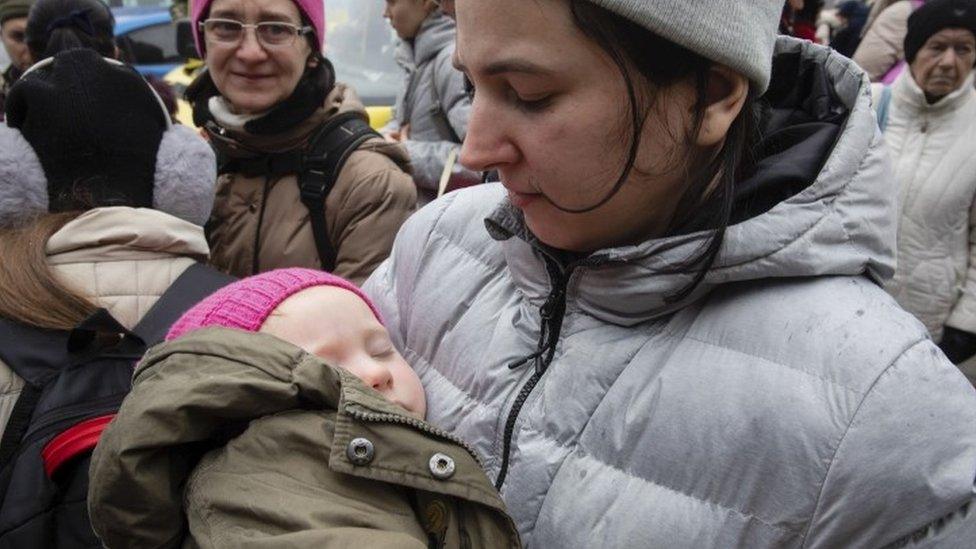
- Published2 March 2022
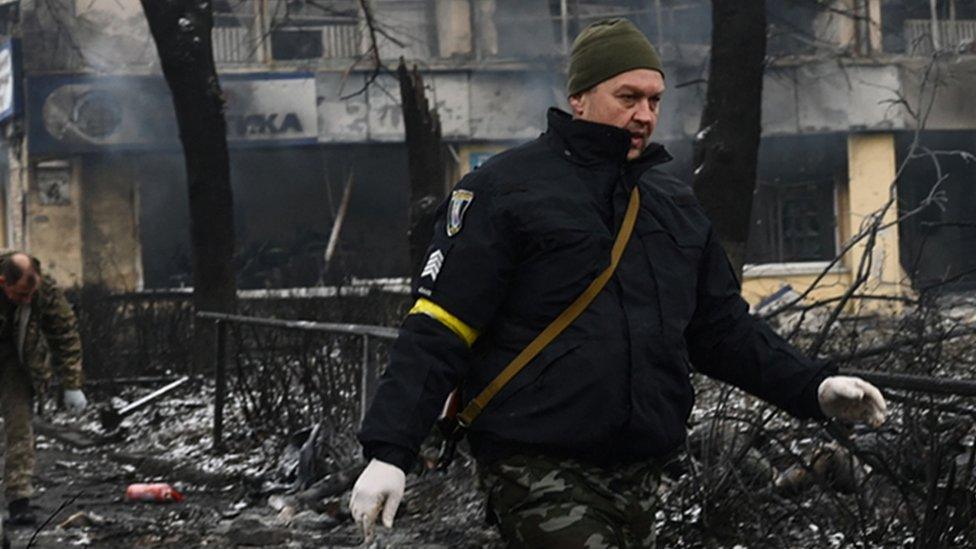
- Published5 March 2022
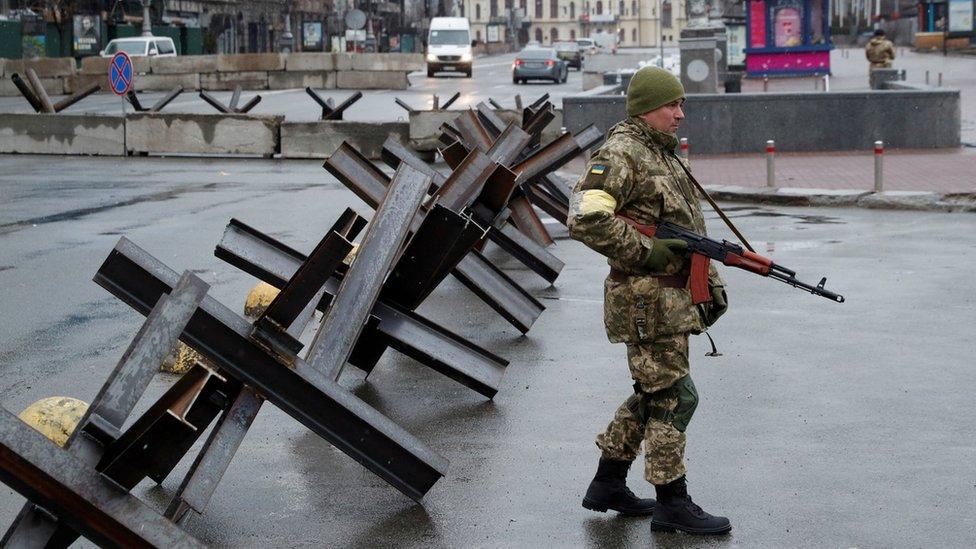
- Published5 March 2022
